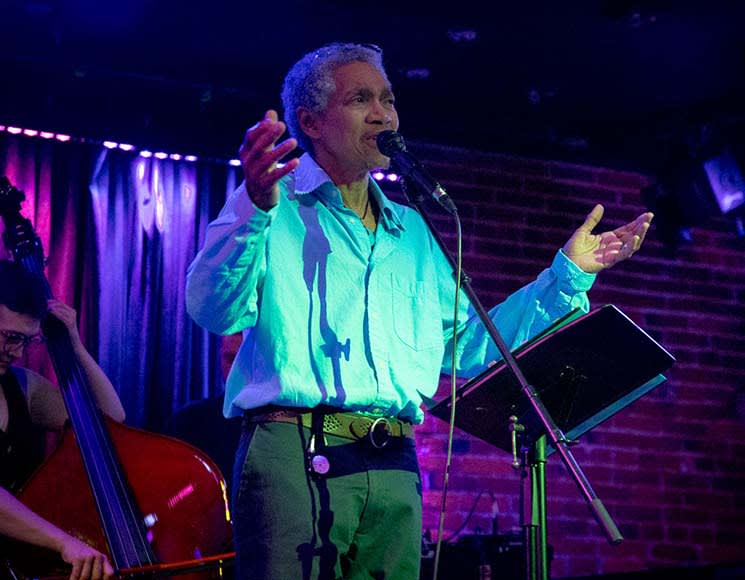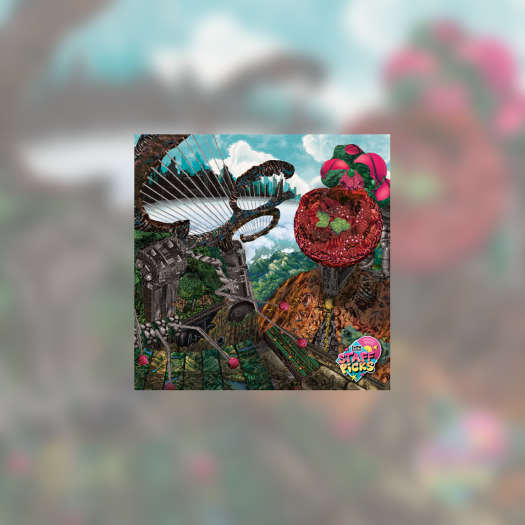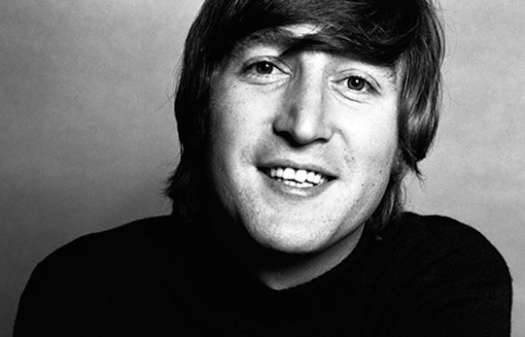Going to see Beverly Glenn-Copeland should be a Pride Month tradition for the whole of Canada. Not only is his music uplifting and joyous, he practically raised most of the country, having spent a quarter-century as an actor on beloved Canadian kid's show Mr. Dressup, in addition to working on Sesame Street and Shiny Time Station, and representing the Great White North as a classical singer at Expo 67.
Along the way, he produced half-a-dozen albums that effortlessly blend ambient, new age, pop, folk and jazz, most of which were promptly ignored by the world at large. First identifying as a lesbian, publically, in 1974, he transitioned in the late '90s, and decades later, his works have begun to find their audience. Indeed, now in his mid-70s, everything is finally in its right place.
Hitting the stage first this evening was Victoria's own Elan Noon, the lo-fi psych-pop outfit helmed by Keenan Mittag-Degala. The project only has a single album out so far, 2017's Have A Spirit Filled, but apparently another one recorded, as he certainly played a few tracks that weren't on it. After he played a couple of his freak-folkish numbers on solo guitar, beginning with "Blue," he was joined by Evan Cheadle of the Deep Dark Woods (whom he dubbed "the fiery bandit of the six-string washboard") on electric guitar, Robert "Doctor Bobbie Robbie Baby" DiNinno on bass, and "Bobbie Doctor Robbie Baby" Thomas DiNinno on drums.
There were a few unfinished seams apparent, as Mittag-Degala's voice struggled to reach certain higher notes, and he admitted to nerves making his arms feel like claws. The missteps were forgivable in context, though. With his band helping to flesh out a selection of subdued, yet flavourful compositions somewhere between Mac DeMarco, Daniel Romano and Kurt Vile in the scale of retro-rock alt-country pop, Mittag-Degala was a real charmer up front, announcing his first-ever attempt to tune and banter at the same time, and later asking the crowd to throw up a sweat rag for Cheadle in what he dubbed to be the comedy portion of the show.
Even though he had more material to draw from and was appreciated by the crowd, they played for a tight half-hour, culminating with a wonderful "I want to be your everything" track that felt like a big classic rock show finale on a smaller scale.
Beverly Glenn-Copeland clearly counts among Elan Noon's fans now, as he huddled with the band onstage for a good while after their set, and expressed appreciation for the journey they'd take him on, saying that he was still recovering after being knocked out by their last few "absolutely brilliant" tracks. Before Glenn-Copeland's band started playing, he introduced them: Nick Dourado on piano, Carlie Howell on double bass and oboe, Bianca Palmer on drums, and Jeremy Costello on a bass guitar and Yamaha DX7 keyboard, and Kurt Inder on various guitars and synths. They're properly known as Indigo Rising, but Glenn-Copeland said he's started refer to them as the Wonder Bunnies, which has begun to stick.
Starting at the beginning, they performed "Color of Anyhow" from Glenn-Copeland's eponymous 1970 album, before delivering a couple of selections from his seminal 1986 work, Keyboard Fantasies, which was based on the revelations of the then-new DX7. After "Let Us Dance," he walked back to the kit to give Palmer an enthusiastic high ten, otherwise stepping aside between songs and gesturing towards his band to give them the credit they deserved.
They really did earn it too. Each song gave at least one member a chance to flash what made them special. "Harbor," a touching ballad written for the 55th birthday of Glenn-Copeland's wife, let Howell showcase the emotive side of the double bass. The only country song he ever wrote, from 1983's At Last!, the resilient, downtempo, quietly triumphant waltz "Onward and Upward" allowed Inder to flash his guitar skills. Palmer and Dourado found their moments throughout, though the latter was particularly hilarious, making open-mouthed pained ecstasy faces, head-banging so hard that he flipped his toque over his eyes, and braiding his long hair mid-set.
In addition to his instrumental work, Costello provided a brilliant vocal contrast in most of the songs. His key moment came during "La Vita" from 2004's soon-to-be-reissued Primal Prayer, originally released under the name of Phynix. In it, Costello sang opera tenor in Italian while Glenn-Copeland's testified the up-tempo, quasi-rap lead over a pop house beat, as if Pavarotti and his friends put their spin on "I'm Not the Man I Used to Be" by Fine Young Cannibals.
Glenn-Copeland was at the center of it all, though. His voice was pure magic. Granted, he doesn't still have the three-octave range he used to when he was at the peak of his classical training, but his natural vibrato and calming strength came through as clearly as it did on any of his recordings. When he speaks, you listen with your mind, body and spirit.
More than that, he seemed like a genuinely positive presence in the world. He laughed easily between songs. During them, he waved his hands like he was conducting and orchestra in a dream, his arms swinging open wide, palms up. As a songwriter, and a practicing Buddhist for the past 47 years, he believes he does not individually make so much as he translates what is sent to him, co-creating with the universe itself.
In a world where encores and standing ovations are often clichéd expectations, Glenn-Copeland earned his honestly. Hopefully, there is plenty more where that came from.
Along the way, he produced half-a-dozen albums that effortlessly blend ambient, new age, pop, folk and jazz, most of which were promptly ignored by the world at large. First identifying as a lesbian, publically, in 1974, he transitioned in the late '90s, and decades later, his works have begun to find their audience. Indeed, now in his mid-70s, everything is finally in its right place.
Hitting the stage first this evening was Victoria's own Elan Noon, the lo-fi psych-pop outfit helmed by Keenan Mittag-Degala. The project only has a single album out so far, 2017's Have A Spirit Filled, but apparently another one recorded, as he certainly played a few tracks that weren't on it. After he played a couple of his freak-folkish numbers on solo guitar, beginning with "Blue," he was joined by Evan Cheadle of the Deep Dark Woods (whom he dubbed "the fiery bandit of the six-string washboard") on electric guitar, Robert "Doctor Bobbie Robbie Baby" DiNinno on bass, and "Bobbie Doctor Robbie Baby" Thomas DiNinno on drums.
There were a few unfinished seams apparent, as Mittag-Degala's voice struggled to reach certain higher notes, and he admitted to nerves making his arms feel like claws. The missteps were forgivable in context, though. With his band helping to flesh out a selection of subdued, yet flavourful compositions somewhere between Mac DeMarco, Daniel Romano and Kurt Vile in the scale of retro-rock alt-country pop, Mittag-Degala was a real charmer up front, announcing his first-ever attempt to tune and banter at the same time, and later asking the crowd to throw up a sweat rag for Cheadle in what he dubbed to be the comedy portion of the show.
Even though he had more material to draw from and was appreciated by the crowd, they played for a tight half-hour, culminating with a wonderful "I want to be your everything" track that felt like a big classic rock show finale on a smaller scale.
Beverly Glenn-Copeland clearly counts among Elan Noon's fans now, as he huddled with the band onstage for a good while after their set, and expressed appreciation for the journey they'd take him on, saying that he was still recovering after being knocked out by their last few "absolutely brilliant" tracks. Before Glenn-Copeland's band started playing, he introduced them: Nick Dourado on piano, Carlie Howell on double bass and oboe, Bianca Palmer on drums, and Jeremy Costello on a bass guitar and Yamaha DX7 keyboard, and Kurt Inder on various guitars and synths. They're properly known as Indigo Rising, but Glenn-Copeland said he's started refer to them as the Wonder Bunnies, which has begun to stick.
Starting at the beginning, they performed "Color of Anyhow" from Glenn-Copeland's eponymous 1970 album, before delivering a couple of selections from his seminal 1986 work, Keyboard Fantasies, which was based on the revelations of the then-new DX7. After "Let Us Dance," he walked back to the kit to give Palmer an enthusiastic high ten, otherwise stepping aside between songs and gesturing towards his band to give them the credit they deserved.
They really did earn it too. Each song gave at least one member a chance to flash what made them special. "Harbor," a touching ballad written for the 55th birthday of Glenn-Copeland's wife, let Howell showcase the emotive side of the double bass. The only country song he ever wrote, from 1983's At Last!, the resilient, downtempo, quietly triumphant waltz "Onward and Upward" allowed Inder to flash his guitar skills. Palmer and Dourado found their moments throughout, though the latter was particularly hilarious, making open-mouthed pained ecstasy faces, head-banging so hard that he flipped his toque over his eyes, and braiding his long hair mid-set.
In addition to his instrumental work, Costello provided a brilliant vocal contrast in most of the songs. His key moment came during "La Vita" from 2004's soon-to-be-reissued Primal Prayer, originally released under the name of Phynix. In it, Costello sang opera tenor in Italian while Glenn-Copeland's testified the up-tempo, quasi-rap lead over a pop house beat, as if Pavarotti and his friends put their spin on "I'm Not the Man I Used to Be" by Fine Young Cannibals.
Glenn-Copeland was at the center of it all, though. His voice was pure magic. Granted, he doesn't still have the three-octave range he used to when he was at the peak of his classical training, but his natural vibrato and calming strength came through as clearly as it did on any of his recordings. When he speaks, you listen with your mind, body and spirit.
More than that, he seemed like a genuinely positive presence in the world. He laughed easily between songs. During them, he waved his hands like he was conducting and orchestra in a dream, his arms swinging open wide, palms up. As a songwriter, and a practicing Buddhist for the past 47 years, he believes he does not individually make so much as he translates what is sent to him, co-creating with the universe itself.
In a world where encores and standing ovations are often clichéd expectations, Glenn-Copeland earned his honestly. Hopefully, there is plenty more where that came from.




